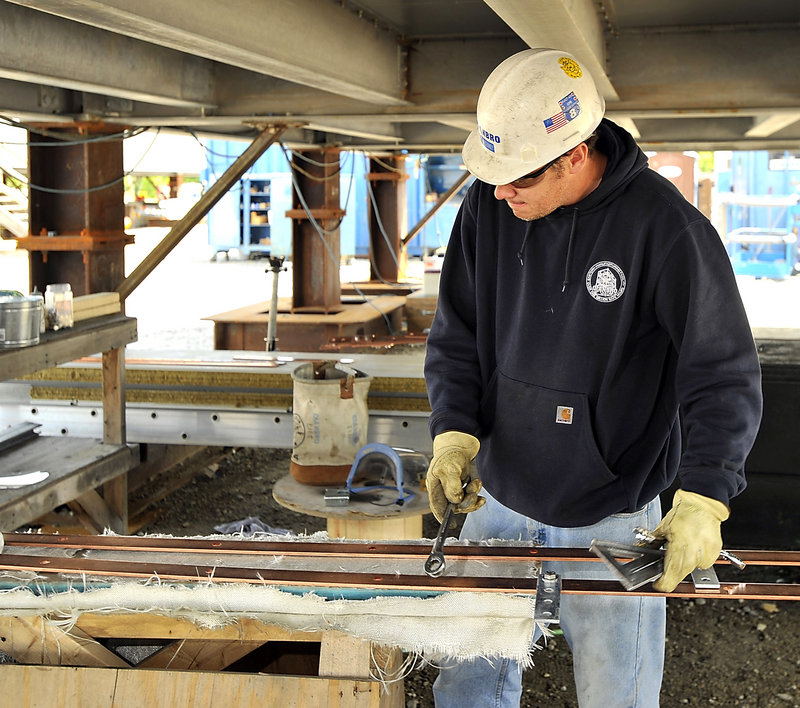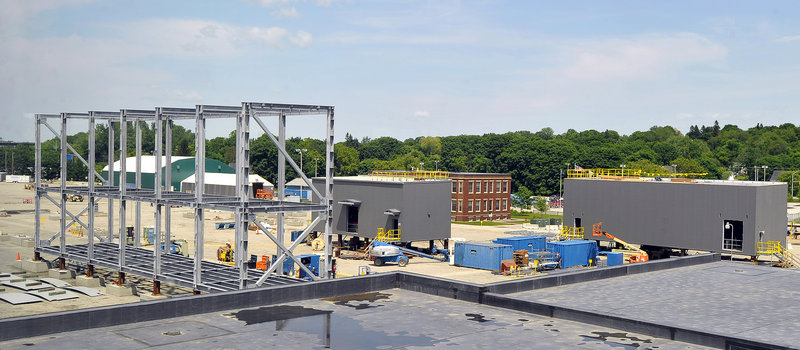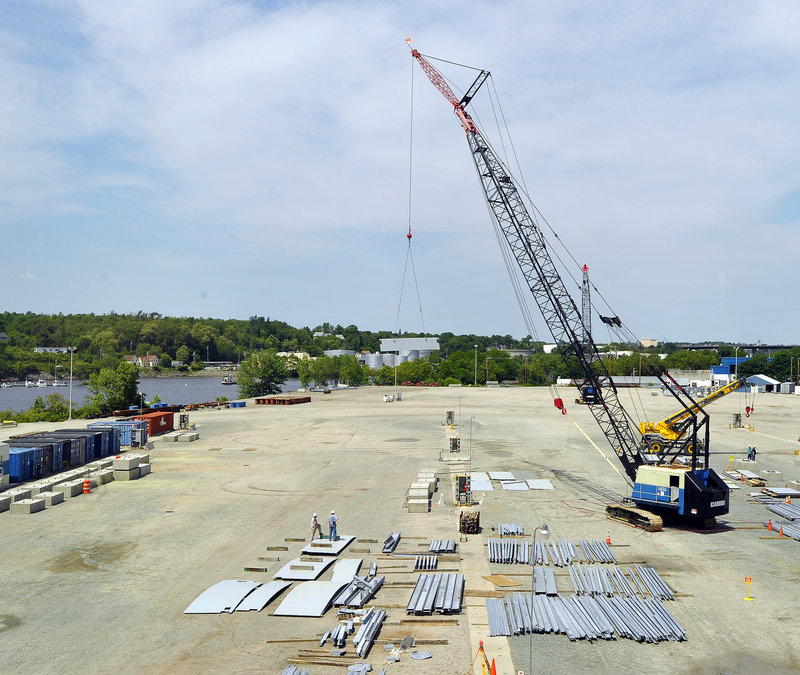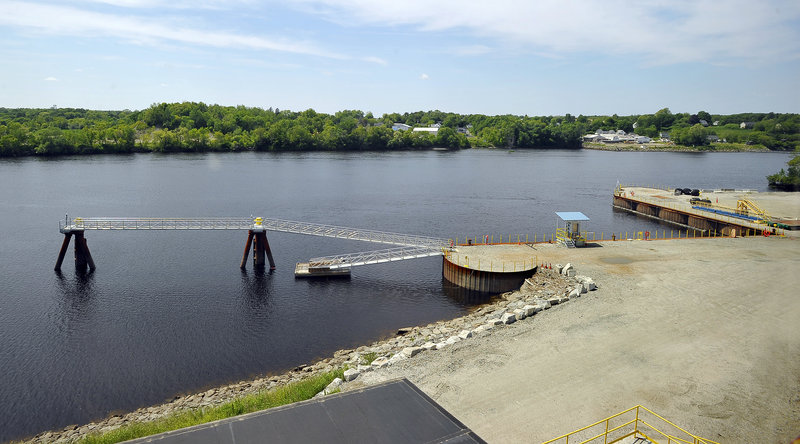BREWER – At a sprawling former paper mill on the Penobscot River, construction workers installed electronic components last week in a steel-framed, gunmetal-gray structure the size of a small apartment building.
Employees at The Cianbro Cos. call the structure a module. It is one of 22 such electrical rooms that will be shipped to a nickel-mining site in Newfoundland.
Executives say the work in Brewer, as well as other new projects, some in burgeoning industries, have diversified Pittsfield-based Cianbro’s revenue sources and allowed the company to expand in Maine.
The projects, they say, also prove that Maine manufacturers have what it takes to compete in a global market.
“We are developing a strategy of exporting (our) knowledge and skill. We get a project and bring it back here and build it,” said Cianbro President and CEO Peter G. Vigue. “The people here are qualified and competent and can compete with anyone around the globe.”
The company that became Cianbro launched in the mid-1940s as Carl E. Cianchette Contractor by Carl Cianchette, son of Raphael Cianchette, who came alone to the United States on the passenger ship Canopic from Naples, Italy, in 1906.
Carl started the business with help from his brothers, who contributed a pickup truck and seed money from their Army pay. Initial jobs included loading pulp into a boxcar in Burnham and building an addition to a Pittsfield mill.
Later, Carl’s brothers Ken, Bud and Chuck became partners and the company was renamed Cianchette Brothers Inc. Revenue hit $200,000 in 1950 and $1 million by 1955, according to the Cianbro website. Projects included piers, canals, bridges and work at Loring Air Force Base in Limestone.
Cianchette Brothers employed 100 workers in 1965 and earned revenue of $18 million in 1970. That year, the company’s name changed to Cianbro Corp. following two acquisitions.
John O’Dea, CEO of Associated General Contractors of Maine, said the Cianchettes built Cianbro into a “regional powerhouse.”
“They hustled and were driven. They were aggressive and had a vision. They wanted to be a first-rate company and they were innovators,” he said.
Today, Cianbro — now called The Cianbro Cos. — has 4,000 employees, including 1,300 in Maine, and operations in 41 states and overseas.
Vigue said Cianbro’s revenue is in “excess of half-a-billion” dollars, though he declined to provide specifics. The company is 100 percent employee-owned.
Cianbro includes 10 subsidiary companies that work in a variety of industries.
Construction projects have included the Penobscot Narrows Bridge near Bucksport, the Pearl Harbor Memorial Bridge in New Haven, Conn., the Hollywood Slots building in Bangor and the wafer fabrication plant at National Semiconductor.
On Thursday, Bangor’s City Council voted to hire Cianbro to build a new $65 million arena and convention center in Bass Park.
The company has also constructed piers, wind turbines and oil rigs, laid sub-sea cables, upgraded dams, decommissioned nuclear power plants and built the 270-foot Air Force Memorial in Arlington, Va.
Cianbro has proposed the so-called east-west highway, a toll road that would improve transportation between Maine and Canada, shaving hours off travel times, said Vigue.
In 2008, Cianbro opened the 41-acre Eastern Manufacturing Facility in Brewer, on the former site of the Eastern Fine Paper Co. mill, which closed in January 2004. Today, the site employs some 100 workers.
Cianbro tore down much of the old infrastructure, but kept a warehouse and office building.
In Brewer, Cianbro builds modules, which are essentially large steel structures that are fitted together to form complete systems at oil refineries and other heavy-industry sites.
The 22 modules now under construction will be shipped to Newfoundland, where they will become an electronic system at mining company Vale’s nickel processing plant.
Between 2008 and 2010, the Brewer plant made 51 modules for Motiva Enterprises LLC’s oil refinery in Port Arthur, Texas. Vigue said Cianbro competed internationally against some 30 other firms to win that project.
Vice President and General Manager of the Brewer site Joe Cote said the Motiva modules weighed up 700 tons. Some were 120 feet long, several stories tall, held 7,000 feet of pipe and cost about $3 million to build, excluding materials, said Cote.
Cianbro rolled the completed modules onto a barge on the Penobscot, to be pulled by an ocean-going tug to Texas. There, Cote said the modules were fitted together to form “hydrocracker” and “hydrotreater” units, equipment that processes crude oil.
Shipping costs to Texas are substantial, but Cote said they were offset by the efficiency and speed of the Brewer plant.
“It doesn’t take long to make up the difference,” he said.
Cote added that Texas and Newfoundland lack the necessary work force and equipment to build the modules on site.
The Brewer site employed hundreds of workers at the peak of production, but Cianbro cut staff as oil prices fell in 2008 and demand declined due to the recession.
Cote said Cianbro “made a big statement” with the Motiva work.
“Companies wait a lifetime for this job, and most of them don’t have a chance,” he said.
Vigue said Cianbro also gained access to new customers and markets in November 2010 with the acquisition of Starcon International Inc., which provides contractor services to the refining and petrochemical industries.
Vigue said the companies will cross-sell each other’s product, allowing Cianbro to expand into new regions.
Vigue said the new work, particularly the oil, gas and energy projects, has helped Cianbro rely less on infrastructure projects and work related to the pulp and paper industry. He said that more than 10 years ago, roughly 70 percent of Cianbro’s revenue in Maine came from pulp and paper, compared to just 8 percent to 10 percent in recent years.
Vigue said Cianbro’s success with new projects should give other Maine businesspeople “confidence that they can invest here and they can succeed here and compete.”
“I want to convince others that they can do it as well,” he said.
O’Dea at Associated General Contractors of Maine said Cianbro’s leaders have always taken the “longer term” view, focusing on new opportunities and new projects.
“There isn’t much they won’t try,” he said. “The company has a proactive posture.”
O’Dea added that Cianbro is “constantly grooming the next generation” of leaders and investing in training and professional development programs.
But O’Dea said the construction sector is “in very rough shape,” with unemployment in the sector at about 20 percent nationwide, and slightly lower in Maine.
In recent years, O’Dea said, industry margins have tightened as more companies bid on projects. A bridge that had three to five bidders three years ago might have twice that many today.
O’Dea said construction in Maine is a $5.6 billion industry, accounting for roughly 12 percent of the state’s GDP.
There were 23,200 construction workers in the state in July 2010, down 6.1 percent from 2009 and 28 percent from the peak in April 2006.
Vigue said cash-strapped state governments have cut spending on infrastructure recently.
But he said that creates opportunity for private investors to fund the types of projects that have been paid by governments.
“There are trillions of dollars sitting on the sidelines waiting to be invested,” Vigue said. “Roads. bridges … water systems. Much of that will be privatized.”
Vigue declined to disclose Cianbro’s annual revenue, but said the company’s sales and work force are growing.
“Our backlog (of projects) is up,” he said “We will continue that trend, but it requires that we are diversified.”
He added that Cianbro has kept health care costs relatively low with a wellness program that emphasizes safety and healthy living.
“There’s no tobacco in this company. No smoke. No chew,” said Vigue.
In 2004, the American College of Occupational and Environmental Medicine recognized Cianbro as having the best corporate health program in America. Cianbro also earned awards from the Wellness Council of America.
Vigue said Cianbro’s health care costs have increased less than half as much as at other companies. In some years, he said, health care costs remained flat.
Vigue said his job is to ensure the long-term success of Cianbro and to pass the company to the next generation of employees.
“Our goal is to grow the company and give people an opportunity they wouldn’t get at another company. … To create an environment from where our team members can retire,” he said.
Vigue said Cianbro will remain in Maine, and avoid being acquired.
“Businesses that grow become very attractive to people that want to do acquisitions. That is a real concern. … This company is not for sale,” he said.
Jonathan Hemmerdinger can be reached at 791-6316 or:
jhemmerdinger@mainetoday.com
Send questions/comments to the editors.






